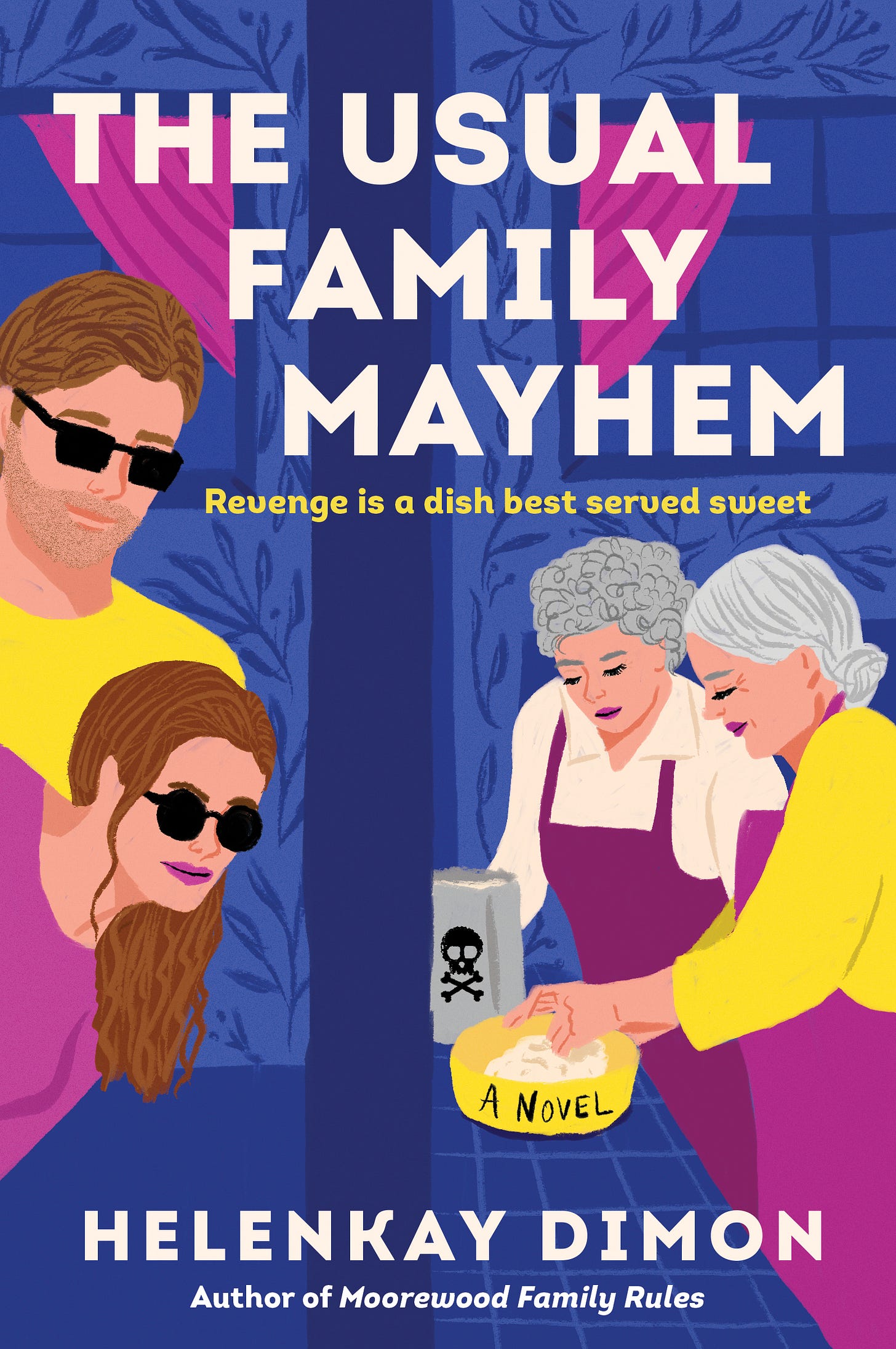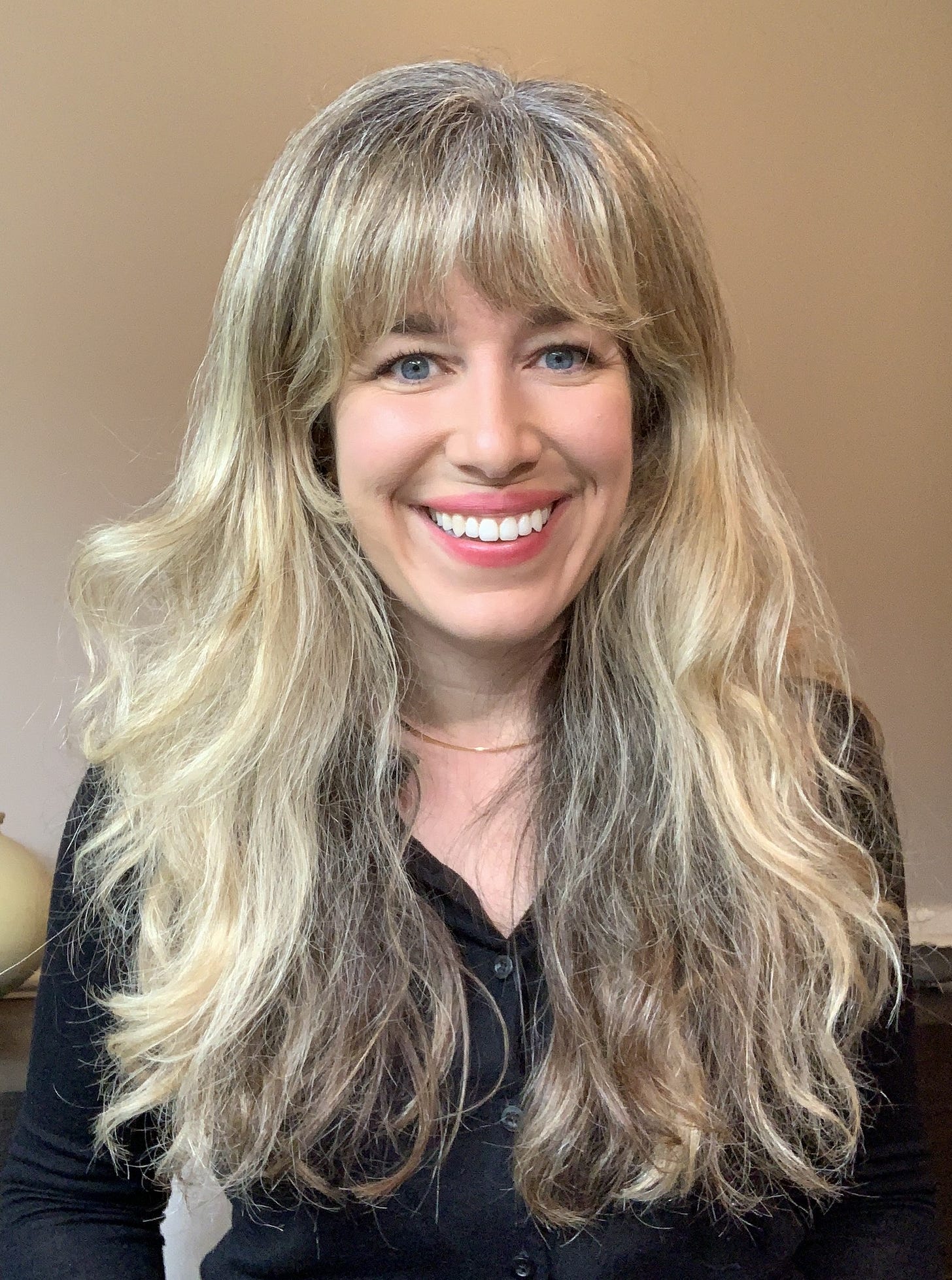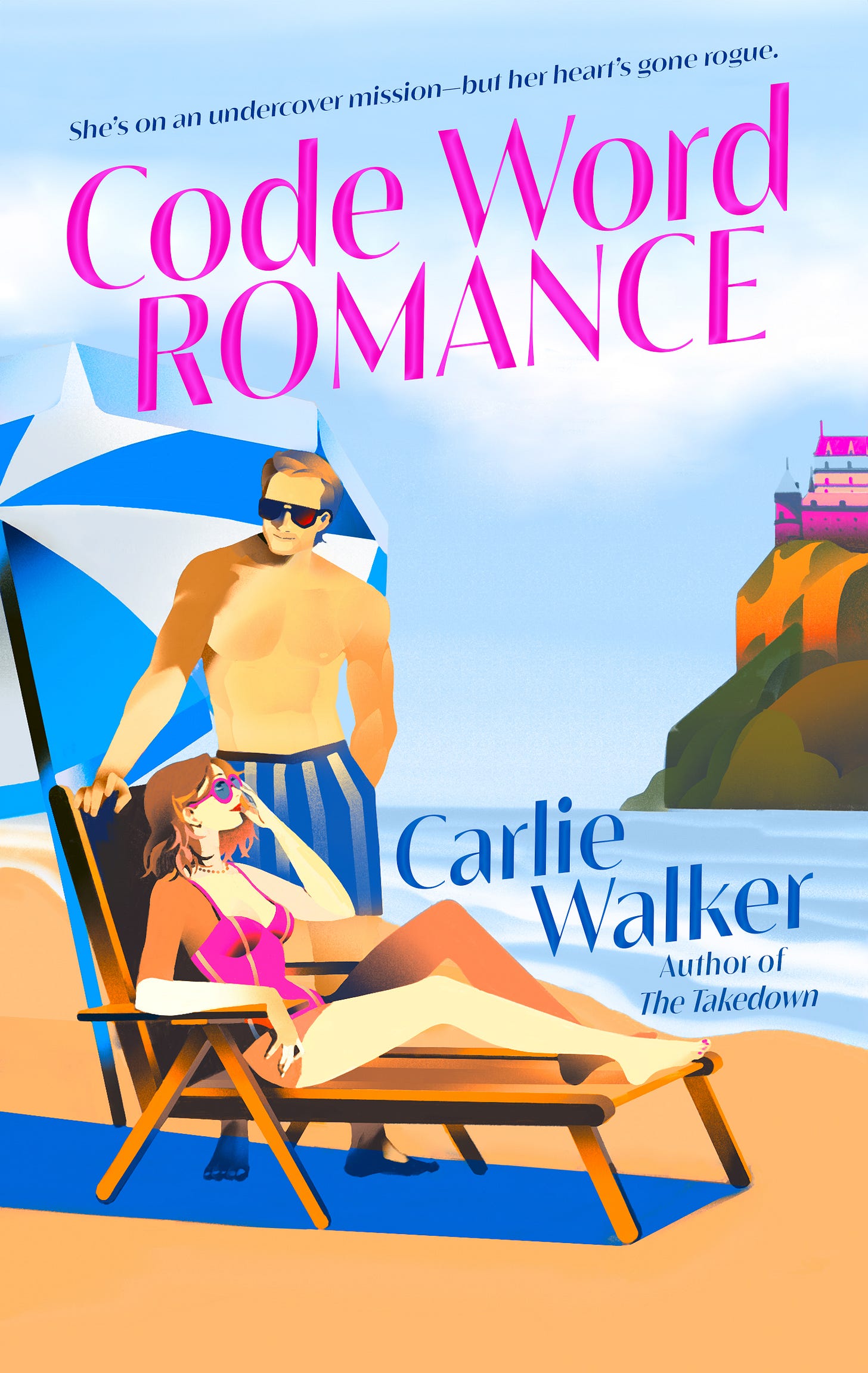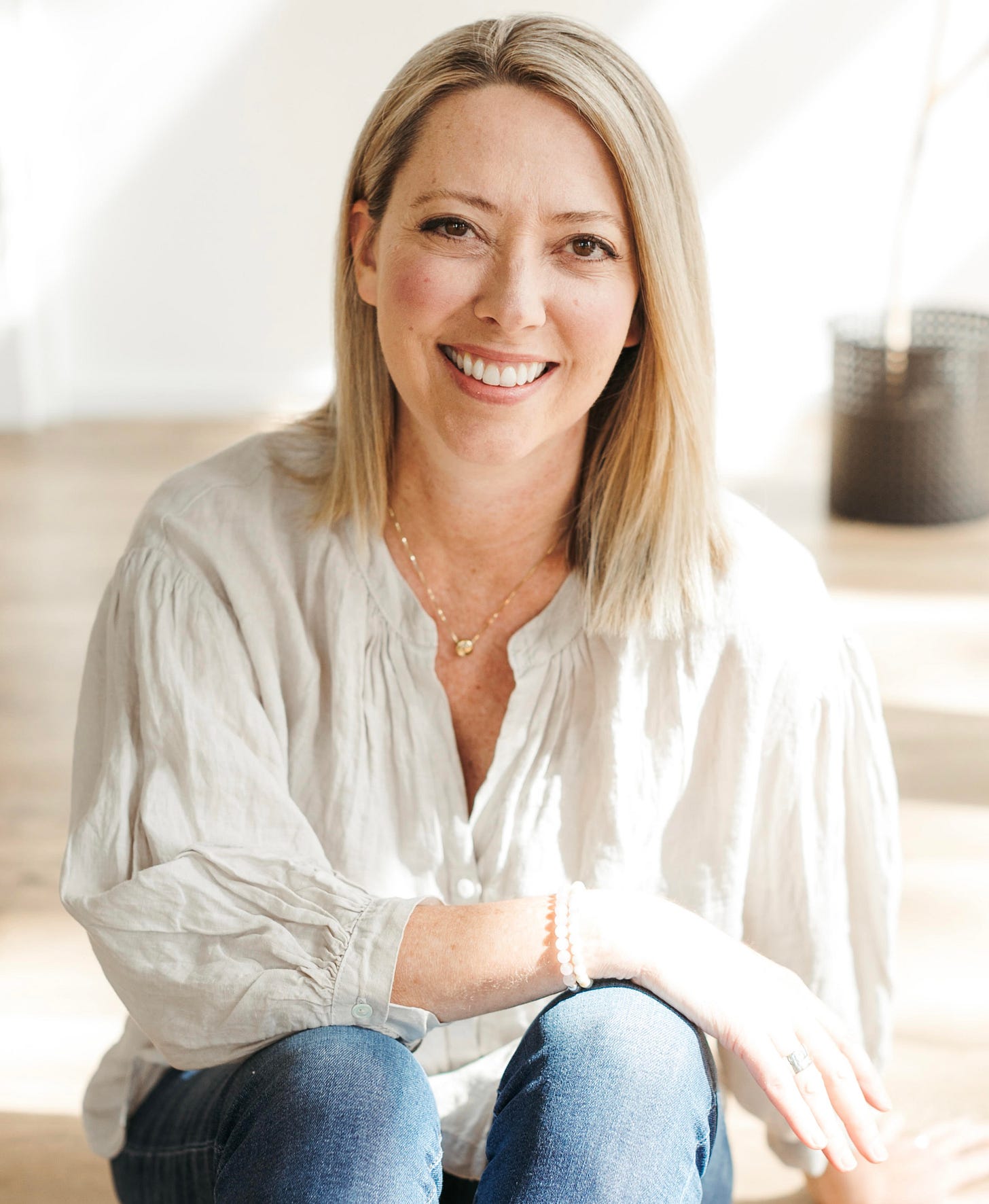✨ HelenKay Dimon & Carlie Walker on Writer Friend Alarm Bells, How to Know if You're Really a Writer...and More; and Guest Agent Lauren Spieller Joins our Hosts for Books with Hooks!✨
Plus, more details exciting details of Bianca's potentially life-changing fundraiser!
Happy Friday, writing friends!
How’s it going? Is everyone hitting their writing goals? Fingers dancing across the keyboard as if guided by forces unseen? Great! As you were. (We’re not jealous. Not one little bit.) But for those in need of some inspiration and encouragement, allow us to present today’s awesome newsletter line-up.
First, it’s 📕Books with Hooks🪝week on the podcast, and this week our hosts are joined by double-threat (she may well have a third talent but, honestly, that would be so unfair) Lauren Spieller, who is both a published author and a literary agent with respected agency Folio Literary Management. Tune in to hear Lauren, Bianca, Carly, and CeCe share their thoughts on a romance and query and one for fantasy, including a discussion of the differences between the adult and YA fantasy genres and the necessity of vulnerability and disruption in storytelling, among other insights. (And don’t forget you can now watch the podcast on YouTube!)
Because we love you, it’s a two-fer Q&A week, with insights from HelenKay Dimon (The Usual Family Mayhem) and Carlie Walker (Code Word Romance).
First up, HelenKay (who also writes thrillers as Darby Kane) shares a piece of advice that is clearly hard-won and so something anyone who hasn’t experienced the flip side of writing success yet (because they have yet to experience writing success. But definitely one day will!) should pay attention to so they don’t have to learn it the hard way. In answer to our question about creating a supportive community, HelenKay advises caution and curation. Keep reading to find out when you should be listening for and what should be setting off alarm bells.
There were some surprises in Carlie’s Q&A. For example, the fact that her go-to mantra for when the writing feels hard is not “Write what you know.” (Editor’s note: Do you always read the author bios? I do, and not just because it’s my job. You never know what fascinating tidbits you’re going to find. Carlie, for instance, went to honest-to-goodness spy school before deciding the only international intrigue she was cut out for took place on the page). In fact, unlike on Tuesday where we were quoting Flannery O’Connor, Carlie’s source of inspiration doesn’t even come from another writer but a (*checks notes*) fake nun. And, honestly, it’s some pretty solid advice.
Finally, don’t forget to check out Bianca’s fundraiser for The Masana Library Project. Keep reading to find out the easy way you can enter to win a whole host of incredible literary prizes (such as developmental edits, coaching packages, and manuscript critiques)! It’s a great cause and a great way to help others while helping yourself!
The Shit No One Tells You About Writing Team
P.S. Still not sure about upgrading to paid? Check out our Tuesday Teaser below to see what you’re missing!
This Week’s Podcast✨🎙️✨
This week on the podcast (listen to it here or watch it on YouTube!), Bianca, Carly and CeCe welcome special guest, literary agent, Lauren Spieller to discuss query letters in the romance and fantasy genres. The hosts discuss the intricacies of character development, particularly focusing on the protagonist's depth and emotional projection. The panel discusses a high concept query that intertwines elements of romance and fantasy, emphasizing the need for balance between plot and emotional resonance. They explore the importance of motivation, the implications of dark romance, and the effectiveness of the author’s title.
“Ultimately that's really what an agent is looking for. Does this book feel like it has good editorial bones and is it going to be something that I can sell?”
-Lauren Spieler
Q&A with HelenKay Dimon!
HelenKay Dimon is a former divorce lawyer with a dual writing personality. Her books have been featured in numerous venues, including The Washington Post, The New York Times, and Cosmopolitan. Her most recent release, Moorewood Family Rules, has been optioned by Paramount for television. She also writes thrillers as Darby Kane and is a #1 international bestseller in that genre. Two of her thrillers have been optioned for television, including her debut, Pretty Little Wife. For more information go to helenkaydimon.com
TSNOTYAW: Do you have a go-to mantra or pep talk for the days when writing feels hard?
HelenKay Dimon: Whenever I get frustrated or have a setback or just plain wonder why I decided to travel this shaky and uncertain career path, I repeat this phrase: “I didn’t come this far to only come this far.” It’s my “keep going” chant.
What would you say you’ve done right to build a strong and supportive writing network?
Two words: carefully curate. My first single title came out in 2007. I quickly learned that there are people in the writing business you should avoid or at least limit their access to you because they can derail you and your self-confidence. [Note: this is true in the non-writing world, too.] Alarm bells should go off if a person’s support for you changes when your career trajectory changes in a positive or negative way. Do they need you to succeed because they want something from you? Do they need you struggle because they need to feel like they have an advantage over you? These groups sound easy to detect and ferret out, but they aren’t. Watch how your career changes and see if their support does. I surround myself with people who are honest with me even when it hurts. They tell me to get offline when I need to be offline, cheer for me to succeed, and support me with a delicate balance of letting me whine and telling me to stop whining and get back to work. But—and this is the important part—I always feel as if they are as invested in my career and my success as I am. They genuinely want me to do my best for me, not for any other reason, and I feel the same way about their careers. I want them to shine.
What one piece of advice (craft- or publishing industry-related) has always resonated with you?
My first editor, Kate Duffy at Kensington Publishing, gave me a piece of advice about the need for persistence and a willingness to adapt that I think about almost every day because it’s so easy to forget: “Your career is a marathon, not a sprint.” Looking at writing as a long-term investment that might not result in short-term gains has helped me to pivot, when needed, and to dig in at all times.
What's one writing "rule" or commonly followed piece of advice that you decidedly break?
I break the rule that insists there are rules. “You can’t sell a book that’s part time travel, part romance, part historical, part battle, part fantasy, part adventure…” -said someone, probably. Tell that to Diana Gabaldon. You’ll find her at the bank, rolling around in a big pile of Outlander book and television series money. On a smaller scale, I wrote a romantic suspense that started with a woman in a coffee shop, staring out the window and seeing a man who might be stalking her. A reader who was also an unpublished writer emailed and said she liked the scene but was told you should never have a person look out a window at the beginning of a chapter, or some such thing. She wanted to know why I broke the rule and what my editor said about it. My editor didn’t say anything because that’s not actually a rule. The scene was right for the book, so it stayed in. My advice? Never forget you’re a storyteller. Think about when you were a kid, sitting around a campfire, telling ghost stories. The person reciting what was likely a variation on a “this is how these campers got killed years ago, I know because a friend of my older sister’s friend knew them” story didn’t get bogged down in boring backstory or trite dialogue or worry about rules. The person told a story meant to entice the audience. Do that. You can edit whatever doesn’t work later.
What is the most challenging part of being a successful author? And how do you mitigate its effects?
The feeling of falling behind and not being good enough haunts most authors I know, me included. Writing isn’t like other careers where if you know what you’re supposed to do and do it well and put in the time you’ll succeed. I remember hearing a bestselling author give a talk to unpublished writers and say, “all you have to do is write the best book you can.” My head exploded because that’s just not true. There are writers who write amazing books and still never get published or, if they do, they never get traction with readers. There are popular books that sell in huge numbers, and you’ll wonder why because you don’t see anything “special” about the book that explains the heaps of reader praise. There are writers who start after you and their careers shoot past yours. This career is a mix of talent, timing, and luck. It’s so easy for the doubts to creep in and to look around and wonder why “it” isn’t happening for you. I try to combat this by thinking about a line from school: “keep your eyes on your own page.” That’s the key. Stop comparing. Realize what’s happening “over there” is unrelated to your career and might not even be as shiny and wonderful as it appears. Keep your eyes on your own page (a seemingly impossible task some days) and stay off Goodreads. That’s a place for readers, not authors. The comments there can drop you to your knees. Worse, they can impact your writing.
Writer’s block: myth or unfortunate reality? If you experience it, how do you overcome it?
I’ve decided writer’s block isn’t real. If I’m wrong, please don’t tell me. I keep the possibility of shutting down or coming to a stop out of my mind and my office by ending every workday before my writing energy is depleted. The last thing I do, with the book still fresh in my mind, is write out the dialogue for the next scene. Just the dialogue. No narration, no exposition, no thoughts, no dialogue tags. Just pages with lines of quotes. It represents the character conversation firing in my head when I wrap up. So, except for the first day of writing a new book, I never start the day with a blank page. I sit down with lines to review, assess, and revise. The words might not be the right ones, but this system gives me a place to start. It also ensures I know my plot and characters well enough that I can decipher what’s happening based on a few unattributed lines.
What do you wish you had known about writing before you published your debut?
This career never gets easier. By that I mean every single part of the process—writing, money, relevancy, sustainability, discoverability, inadequacy and self-doubt. Don’t fight this. Publishing can blindside you. It’s not easy. It’s not fair. Sometimes it doesn’t make any sense. Anyone who says otherwise probably isn’t telling you the truth. Your job is to know all of these potential pitfalls and write anyway. My author life became easier when I accepted that I can only control the writing. Honestly, that’s enough of an emotional rollercoaster without the other stuff. Get the book down first then tackle the rest. I’ve realized my wild panic-ridden mess of creating remains consistent from book to book, which is strangely comforting. These writing stages might sound and look familiar. If so, do not panic. Know you’re not alone and embrace them:
-The first 30 or so pages are filled with wonder and excitement.
-Around pages 35-75 the “Should I be writing something else? Am I ever going to hit 25,000 words?” doubts come knocking.
-Pages 75 to about 150 are a painful slog. This is the “I’ve forgotten how to write. How have I ever finished a book before?” section.
-From page 150 and continuing for about 100+ pages, I enter the hazy “I have no idea what I’m writing or if this works, or if it makes any sense…argh!” part of the book. -When I shift into the final push of the book, I slip into the “I need this to be over because I’m sick of this.” stage.
-In those last chapters that bring everything together and wrap things up, I hit the “Why are these pages taking so long to write…yay, I’m done!” part.
When people ask me about my process, I should tell them about this because this happens every book. Every single book. Only the exact page numbers change.
You can purchase The Usual Family Mayhem on our Bookshop.org affiliate page here. Buying books through this link supports a local indie bookstore, as well as The Shit No One Tells You About Writing 📚❤️
Q&A with Carlie Walker!
Carlie Walker attended the University of North Carolina at Chapel Hill, where she first majored in Peace, War and Defense, a feeder program for intelligence services—before realizing that she is way too anxious to be a spy. Having gone on to study at Oxford University and at City, University of London, she worked briefly in publishing before becoming the bestselling author of eight books for children and young adults. She has a registered 250-pound dead lift, volunteers in a cat shelter, and used to spend her Saturdays practicing martial arts. She lives in Marietta, Georgia, with her husband, young son, and their American dingo.
TSNOTYAW: Do you have a go-to mantra or pep talk for the days when writing feels hard?
Carlie Walker: Yes, I do. I’m going to paraphrase here, but there’s a great scene from Sister Act II: Back in the Habit, where Whoopi Goldberg’s character asks Lauryn Hill’s, “What do you think about when you first wake up in the morning? If it’s singing, then you should be a singer.” And that has stuck with me since I was ten years old. I write because I love stories. I write because for most of my life (my life before having a kid, at least), it’s been the first thing I think about when I wake up in the morning. I tell myself that must count for something.
What one piece of advice (craft- or publishing industry-related) has always resonated with you?
I have absolutely no clue where (or who) I got this from, but I once heard that, if you’re stuck at the crossroads of a story, you should get out a piece of paper and write down everything that could possibly happen at that moment. Then, pick the most surprising yet understandable event, and write that scene. It’ll keep you—and the reader—on your toes. Twists aplenty.
How do you ensure you have enough time to write amidst so many obligations competing for your time?
My son is 15 months old. Whenever he takes a nap, I write. That’s the deal I’ve made with myself. As soon as he starts snoozing, I start typing. I think the key is total focus during the small chunks of time that you have. Put away your cell phone. Stop checking Instagram. Neurologically, it takes 20 minutes to regain intense concentration; don’t keep putting yourself in the hole. If you only have a short period of time to write, focus fully on the page.
What's one writing "rule" or commonly followed piece of advice that you decidedly break?
You know the saying “show, don’t tell”? Sometimes you really do have to tell. Sometimes it’s the most efficient way to get you where you need to go. Oh, and I love a good adverb (even if Stephen King insists they’re unnecessary).
How important do you think it is for writers to be on social media?
I think it varies from writer to writer. Personally, I love connecting with readers. I also find—overall—that social media drains me creatively and emotionally. When I’m actively drafting, I delete Instagram from my phone. The more time you spend online, the less time you spend on the page. If you want to keep a presence so that people can reach you, great! But does posting and scrolling all the time actually move the bar in terms of sales? Or does it just keep you from writing?
How did you get your literary agent? What was the querying process like for you?
About a decade ago, I was working as an editorial assistant at the publisher Faber & Faber, when I met my agent, Claire Wilson, in the office. She was so sharp and so knowledgeable, and I knew immediately that I wanted to work with her (if she would have me!). I queried her via email shortly after that, along with 32 other agents, and received 5 offers of representation within a few weeks. I’m glad that I didn’t have to wait very long, because I was a nervous wreck! What helped me was working on another project at the same time. It gave me hope that even if my queries didn’t result in any offers, I’d have another chance down the road. Best of luck to anyone on the journey!
You can purchase Code Word Romance on our Bookshop.org affiliate page here. 📚❤️
Tuesday Teaser 😉
Paid members will find Carly and CeCe’s written critiques of the 📕Books with Hooks🪝 queries discussed on this week’s podcast in next Tuesday’s newsletter. We’ve also got: an author Q&A with Jessica Bull (A Fortune Most Fatal), who reaches further back than Whoopi Goldberg and Flannery O’Connor for the writing advice she lives by (and it has clearly worked REALLY well for her—her debut was sold in a major deal!); an essay by C.B. Everett (aka Martyn Waites) whose writing is so funny you might have to read his essay twice to notice all the bits of solid gold wisdom you missed while laughing; and a video from Katy Hays (whose name you might recognize from the her New York Times bestseller, The Cloisters), who argues that all great novels, not just thrillers, have some kind of twist—and shows you how to find yours (even if you’re a pantser!)
Not yet a member? For just $8USD a month or $80USD a year you get:
an exclusive newsletter on Tuesdays featuring bonus author Q&As and other exclusive content from industry experts
access to Carly Watters and CeCe Lyra’s written notes on queries from the podcast’s Books With Hooks feature
monthly bonus podcast episodes, AND
regular Ask Me Anythings / Q&As with Carly, CeCe, and Bianca Marais.
If that doesn’t kickstart your writing journey, we don’t know what will!
Fundraiser for Literacy in South Africa!
Would you like to do some good in the world, and at the same time be entered to win amazing (and we really do mean amazing🤩 ) literary prizes?
Trick question, of course, because who wouldn’t?!
And you’re in luck, because Bianca is hosting a fundraiser for a cause that’s close to her heart—literacy in South Africa—with a whole host of incredible literary prizes up for grabs, including developmental edits, coaching packages, manuscript critiques, Books With Hooks appearances…and so much more!
All you have to do to enter is make a donation to a wonderful cause: The Masana Library Project. By participating in this fundraiser, you’ll be helping supply a South African high school with the kind of basic resources we take for granted in North America, improving their education and making a brighter future for South African learners.
Entries close at 8am ET on April 10th. Until then, keep reading to meet three of our awesome sponsors and learn about their prizes, then head over to Bianca’s website to enter the draw!
Nicole Meier is a certified book coach and author of four novels. She hosts the Steps to Story podcast for emerging novel writers. Her books have been recognized by Booklist, Refinery29, BookBub, and Popsugar. She lives and works in the Pacific Northwest. Her services include courses, developmental editing, and 1:1 coaching.
The prize Nicole has sponsored:
25-Page developmental edit. Take a deep dive into your novel manuscript with this partial developmental edit. With this package, you’ll receive feedback in the form of big-picture notes on your manuscript’s first 25 pages, in-line comments with actionable suggestions on scene structure, character, plot, pacing, believability, POV, and style. Wrap it up with a 30-minute coaching call to go over the feedback. (Value $250)
Where you can find Nicole:
https://nicolemeier.com/
Substack:
Nicole Meier
Christina Boyd wears many hats as she is a writer, an editor under her own banner, The Quill Ink, a reviewer, and an artist. Since 2013, Christina has curated seven multi-author anthologies and edited over fifty-five books. A life member of the Jane Austen Society of North America and the Pacific Northwest Writers Association, Christina lives quietly in the wilds of the Pacific Northwest with her dear Mr. B and a silver Labrador--now that her Boydlings have gone off on adventures.
The Prize Christina has sponsored:
A Line Edit up to 80,000 words (value $1200.)
Copy editing, also known as line editing, focuses on refining the writing style, including grammar, word choice, spelling, punctuation, and sentence structure.
Christina marks anachronisms and repetition, improves flow, and ensures language clarity and style consistency.
She specializes in Georgian and Victorian eras and also edits contemporary romance.
Where you can find Christina:
https://www.thequillink.com/
Instagram: @christinaboyd_writes
Hanna R. Neier is a novelist, lifestyle writer and freelance editor.
Her essays, interviews, critiques and other articles have appeared in POPSUGAR, Lilith Magazine, Kveller and Motherly, among other publications, and she is the 2025 winner of the Sydney Taylor Manuscript Award.
On the editing side, she works with writers to help them find their voice, build their story and keep their readers turning the page.
The prize Hanna has sponsored:
A developmental edit of the first 10 pages of a novel or memoir.
Valued at $100 (USD).
Where you can find Hanna:
That’s all for this week’s news! If you enjoyed it, why not share the love? 🥰
Tune in again next week for more invaluable wisdom from our wonderful hosts! Until then, happy writing! 😍
❤️ The Shit No One Tells You About Writing Team
Our work takes place on land now known as Toronto and Ottawa and we acknowledge that these are the traditional territories of the Mississaugas of the Credit, the Anishnabeg, the Chippewa, the Haudenosaunee, and the Wendat Peoples as well as the unceded, unsurrendered territory of the Anishinaabe Algonquin Nation. Toronto is covered under Treaty 13 and the Williams Treaties. We respect and affirm the inherent and Treaty Rights of all Indigenous Peoples across this land and acknowledge the historical oppression of lands, cultures, languages, and the original Peoples in what we now know as Canada. We invite you to learn more about the land you inhabit, the history of that land, and how to actively be part of a better future going forward together at Native Land or Whose Land.
Carly Watters and CeCe Lyra are literary agents at P.S. Literary Agency, but their work in this newsletter is not affiliated with the agency, and the views expressed by Carly and CeCe in this newsletter are solely that of themselves and do not necessarily reflect the views, opinions, policies, or position of P.S. Literary Agency.













Is this where we share what would be tattooed on your forehead?? Cece would definitely say, “This needs more interiority” and Bianca would say “we have a lot to unpack here!”
So many nuggets of wisdom in these 2 interviews!